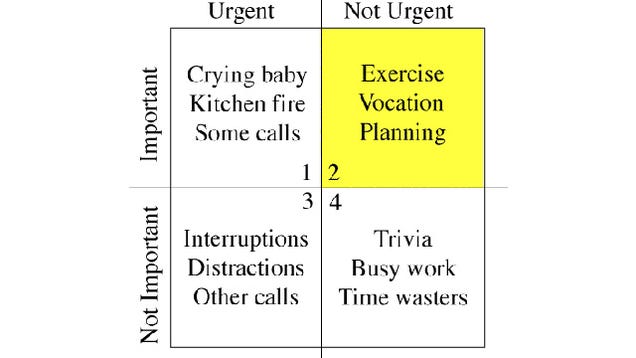
President Dwight D. Eisenhower was the 34th president and a five star general during World War II. He won his first presidential election by a landslide, built the Interstate Highway System, and created NASA. Which is to say, he was pretty productive. Let’s take a look at a few of his best tricks for getting all that done.
Use the Eisenhower Decision Matrix to Manage Your Time

The Eisenhower Decision Matrix is a time management technique based on an unverified quote often ascribed to Eisenhower:
What is important is seldom urgent and what is urgent is seldom important.
The basic premise here is pretty simple: some tasks are urgent and others are not. When you organize those, you can make better use of your time. From this quote, the Eisenhower Decision Matrix was born. The matrix consists of a square divided into four quadrants. Although it’s not really clear if Eisenhower himself used a matrix like this, it’s helpful nonetheless if you’re trying to prioritize your time. Here’s the basic gist of how the four quadrants are organized:
- Important/Urgent quadrants are done immediately and personally
- Important/Not Urgent quadrants get an end date and are done personally
- Unimportant/Urgent quadrants are delegated
- Unimportant/Not Urgent quadrants are dropped
The real crux of this matrix is differentiating between urgent and important. Urgent tasks require immediate attention, important tasks contribute to long-term goals. The Art of Manliness described this as being "reactive" or "responsive:"
Urgent means that a task requires immediate attention. These are the to-do’s that shout "Now!" Urgent tasks put us in a reactive mode, one marked by a defensive, negative, hurried, and narrowly-focused mindset.
Important tasks are things that contribute to our long-term mission, values, and goals. Sometimes important tasks are also urgent, but typically they’re not. When we focus on important activities we operate in a responsive mode, which helps us remain calm, rational, and open to new opportunities.
The end goal of the matrix is to help you filter the noise from your decisions and concentrate on what really matters. If you don’t feel like mapping that out with a pen and paper, here’s an iOS and web app that can help.
Use An Anger Drawer to Get Over Misgivings

Anger is an incredibly frustrating feeling and while we’ve talked about plenty of ways to handle it, it often tends to stick around a lot longer than we think. This is especially the case with people who treat us poorly. It’s often easier to hold a grudge against someone than to get over it and move on. Eisenhower used what called an "Anger Drawer" to fight this problem:
I make it a practice to avoid hating anyone. If someone’s been guilty of despicable actions, especially toward me, I try to forget him. I used to follow a practice—somewhat contrived, I admit—to write the man’s name on a piece of scrap paper, drop it into the lowest drawer of my desk, and say to myself: "That finishes the incident, and so far as I’m concerned, that fellow." The drawer became over the years a sort of private wastebasket for crumbled-up spite and discarded personalities.
If you struggle with grudges or you’ve been wronged by someone, it’s not a bad trick to try. Obviously it takes some mental gymnastics for Eisenhower’s method to work here, but the physical act of getting rid of that name may prove useful over time.
Associate with Smart People and Learn to Delegate

It’s common advice that the smarter people you surround yourself with, the better most projects will turn out, but that doesn’t mean it doesn’t need repeating now and again. Eisenhower was a firm believer in acknowledging the fact that he wasn’t the smartest guy in the room. In his book At Ease: Stories I Tell My Friends, he advises:
Always try to associate yourself with and learn as much as you can from those who know more than you do, who do better than you, who see more clearly than you.
Likewise, Eisenhower was a vocal proponent of the delegation of authority. That’s summed up in his creation of the position of White House Chief of Staff, but also in how he structured his cabinet. He made sure that everyone beneath him did what they were supposed to and he delegated authority in a way that he could ignore the minutia of unimportant decisions. Here’s Eisenhower’s explanation of why he did this:
No staff, council, or cabinet attempted to make decisions for me, yet every subordinate was always expected, within his own area of delegated authority and within the limits of established policy, to solve his own problems. Upon this I insisted; whenever I had to make a decision that properly belonged to a subordinate I admonished him once, but if he failed again it was time to begin looking for a replacement.
While Dwight Eisenhower wasn’t known as a president who accomplished a lot at the time, historians have come to think more highly of him and his techniques. He did things a bit differently than other presidents, but his military experience certainly shaped how he handled a lot of the issues in the Oval Office.

via Lifehacker
Dwight Eisenhower’s Best Productivity Tricks